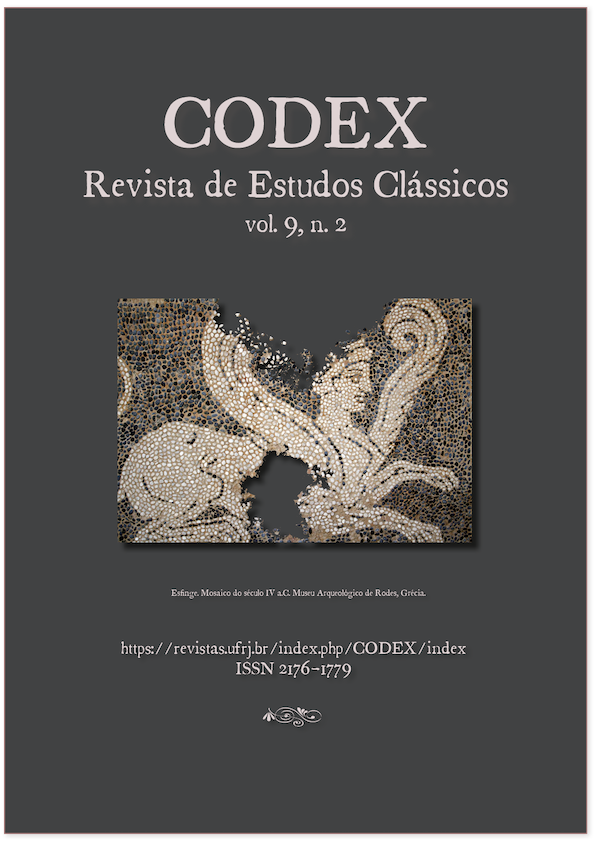World’s Prolegomena: a study of the organization of the primordial elements in Ovid’s "Metamorphoses"
DOI:
https://doi.org/10.25187/codex.v9i2.43511Keywords:
Ovid, Metamorphoses, cosmogony, poetic expressivity, translationAbstract
Inserted in the cosmogonic theme, poetically narrated by Ovid (43 BC - 17 AD) at the beginning of his Metamorphoses, this study focuses, more specifically, on the process of organization and composition of the primordial elements that shape the world, after the Chaos, the origin of everything. The excerpt under analysis consists of the hexameters from number 21 to 75, in Book I, which succeed the description of the Chaos and precede the anthropogony. In this thematic section, one highlights the minerals, flora, and fauna, with emphasis on the four primordial elements: fire, air, earth, and water. With its distinction, the world is being formed from a “recipe for life”, step by step. Between Chaos and Cosmos, one traces, in the Ovidian verses, the system of creation of the world, searching expressive language resources that compose these hexameters, regarding its textual ordering. Therefore, between the order of the world and the order of the verses, one considers the imagery and the meaning effects aroused. Moreover, this study presents a translation that supports the literary analysis.
Downloads
References
ANDERSON, William S. Edition, Introduction and Commentary. In: OVID. Ovid’s Metamorphoses. Books 1-5. Oklahoma: University of Oklahoma Press, 1998.
BIGNONE, Ettore. Empedocle. Studio critico traduzione e commento delle testimonianze e dei frammenti. Roma: Bretschneider, 1963.
CHCHEGLÓV, I. K. Algumas características da estrutura de As Metamorfoses de Ovídio. In: SCHNAIDERMAN, Bóris (Org.). Semiótica russa. Trad. Aurora F. Bernardini et al. São Paulo: Perspectiva, 2010, p. 139-157.
COMMELIN, P. Mitologia grega e romana. Trad. Thomaz Lopes. Rio de Janeiro: Ediouro, [19--].
CONCHE, Marcel. Texte Grec, traduction, présentation et commentaire. In: PARMÉNIDE. Le poème: Fragments. Paris: Presses Universitaires de France, 1999.
COSTA, Alexandre da Silva. Heráclito: fragmentos contextualizados. Rio de Janeiro: Difel, 2002.
GRAVES, R. The Greek myths. London: Folio Society, 2000.
GREIMAS, Algirdas Julien; COURTÉS, Joseph. Dicionário de Semiótica. Trad. Alceu Dias Lima et alii. São Paulo: Cultrix, 2008.
HEIDEGGER, Martin. Gesamtausgabe. I. Abteilung: Veröffentlichte Schriften 1914-1970. Band 5: Der Ursprung des Kunstwerkes (1933/36). Frankfurt: Klostermann, 1977.
HEIDEGGER, Martin. Gesamtausgabe. II. Abteilung: Vorlesungen 1923 - 1944. Band 55: Heraklit (1943/44). Frankfurt: Klostermann, 1979.
HEIDEGGER, Martin. Gesamtausgabe. II. Abteilung: Vorlesungen 1923 - 1944. Band 54: Parmenides (1942/43). Frankfurt: Klostermann, 1992.
HESÍODO. Teogonia. A origem dos deuses. Estudo e tradução Jaa Torrano. São Paulo: Iluminuras, 1995.
HOMÈRE. L’Odyssée. Poésie Homérique. Texte établi et traduit par Victor Bérard. Paris: Les Belles Lettres, 1924.
LUCRÈCE. De la nature. Texte établi et traduit par Alfred Ernout. Paris: Les Belles Lettres, 1985.
MASCARENHAS, Sérgio. Novos olhares de Janus. Ribeirão Preto, SP: Funpec, 2018.
NASA [National Aeronautics and Space Administration]. Moon Phase and Libration [on-line]. 23 nov. 2020. Disponível em: https://svs.gsfc.nasa.gov/Gallery/moonphase.html. Acesso em: 21 abr. 2021.
ORTELIUS, Abraham. Parergon, sive Veteris Geographiae aliquot Tabulae. Antverpia: Plantin, 1595. Disponível em: https://www.rare-atlases.com/atlases/16th-century-atlases/1595-ancient-atlas-parergon-by-abraham-ortelius. Acesso em: 21 abr. 2021.
OVIDE. Les Métamorphoses. Tome I (I-V). Text établi et traduit par Georges Lafaye. Paris: Les Belles Lettres, 1966.
OVÍDIO. Metamorfoses. Tradução de Bocage; introdução de João Angelo Oliva Neto. São Paulo: Hedra, 2000.
NUTTON, Vivian. A medicina antiga. Trad. Marisa Motta; revisão técnica de Manoel Barros da Motta. Rio de Janeiro: Ed. Forense Universitária, 2017.
PRADO, J. B. T. Canto e encanto, o charme da poesia latina: contribuição para uma poética da expressividade em língua latina. Tese (Doutorado em Letras). São Paulo, Universidade de São Paulo, 1997.
ROBERT, Danièle. Traduction du latin, présentation et annotation. In: OVIDE. Les Métamorphoses. Arles: “Thesaurus” Actes Sud: 2001.
SARAIVA, F. R. dos S. Novíssimo dicionário latino-português. 11a. ed. (fac-similar). Belo Horizonte, Rio de Janeiro: Garnier, 2000.
SILVA, Agostinho da. Tradução e Notas. In: LUCRÉCIO et al. Antologia de textos [Epicuro, Lucrécio, Cícero, Sêneca, Marco Aurélio]. São Paulo: Abril Cultural, 1973 (Os pensadores).
VEIGA, Paulo Eduardo de Barros. A cosmogonia nas Metamorfoses de Ovídio: um estudo sobre as figuras da origem do mundo, com tradução e notas. Tese (Doutorado em Estudos Literários). Araraquara, Faculdade de Ciências e Letras de Araraquara, Universidade Estadual Paulista, 2017.
VEIGA, Paulo Eduardo de Barros. A origem do mundo: um estudo sobre o episódio cosmogônico das Metamorfoses de Ovídio. Codex – Revista de Estudos Clássicos. Rio de Janeiro, vol. 8, n. 1, p. 27-42, 2020.
VERNANT, J.-P. O universo, os deuses, os homens. Trad. Rosa Freire d’Aguiar. São Paulo: Companhia das Letras, 2000.
Downloads
Additional Files
Published
How to Cite
Issue
Section
License
This work is licensed under a Creative Commons Attribution-NonCommercial 4.0 International License.










